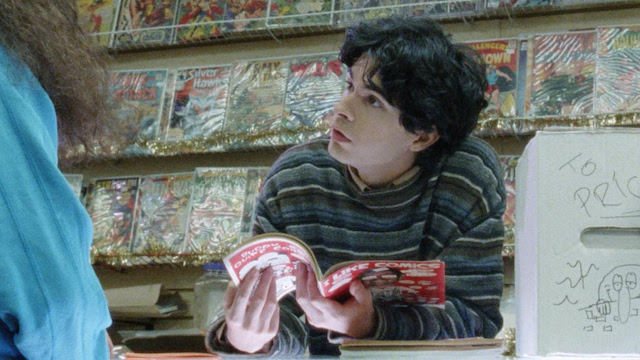Movies & TV / Reviews
Funny Pages Review
 Image Credit: A24
Image Credit: A24

Directed By: Owen Kline
Written By: Owen Kline
Runtime: 86 minutes
MPA Rating: R for crude sexual content, graphic nudity, language, and brief violent images
Daniel Zolghadri – Robert
Matthew Maher – Wallace
Miles Emanuel – Miles
Maria Dizzia – Jennifer
Josh Pais – Lewis
Marcia DeBonis – Cheryl
Michael Townsend Wright – Barry
Andy Milonakis – George
Stephen Adly Guirgis – Mr. Katano
Owen Cline makes his feature directorial debut in his new dark comedy, coming-of-age film, Funny Pages. The title concerns the lead character’s passion for sequential art, as the teenage Robert (Zolghadri) seeks to pursue his passion of becoming a professional cartoonist. Unfortunately, Robert is constantly hindered due to a dysfunctional relationship with his parents and the tragic loss of his mentor and high school art teacher, Mr. Katano (Adly Guirgis).
Robert is serious about his artwork. Mr. Katano suggests that Robert submits his work to publishers right away instead of going through the art school route. Things take a turn when Mr. Katano poses in the nude for one of Robert’s sketches. Robert leaves shortly after starting, seemingly to get to his part-time job. During Robert’s trek to work, Mr. Katano drives on the wrong side of the road to try and give Robert a ride. Another car soon front-ends Katano in a devastating car accident, and Katano dies.
After Robert’s attempted burglary to steal some of Mr. Katano’s artwork ends badly, Robert quits school and decides to live on his own, much to the chagrin of his wealthy, upper-class parents (Josh Pais and Maria Dizzia). Robert begins working for a public defender, Cheryl (DeBonis) and discovers one of her clients, Wallace (Maher) used to be a color separator for Image Comics. Robert is desperate to find a new mentor and seeks guidance from Wallace, who is dealing with emotional problems and anger issues.
Funny Pages is not devoid of interesting cinematic qualities. The narrative is unconventional. Kline’s screenplay does not follow a traditional path. The resolutions are not tied together in a nice and neat little bow. Reality is often uglier and harsher than what is depicted in the movies. Nothing is conveniently resolved here, which imbues the film with a level of truthfulness. The outcomes are often emotionally explosive and volatile.
Kline’s direction lacks modern Hollywood glitz and polish. The film looks grungy, grainy, and dirty. The grimy presentation often matches its subject matter. This includes the underground cartoon strips that fascinate Robert, such as the pornographic Tijuana Bibles he collects. Robert also finds himself in a sketchy living situation, renting part of a lugubrious basement from the eccentric, off-putting Barry (Townsend Wright).
Zolghadri asserts himself well as a young actor portraying Robert, a kid attempting a journey of self-discovery. Robert is passionate and serious about his art and becoming a cartoonist. He is so serious about his art that he is willing to give up a privileged life with his parents to rough it out and live like the cartoonists he admires. However, Robert’s lack of actual life experience makes this a struggle. His strong sense of sequential art identity meets a brick wall in the form of Wallace.
The Wallace subplot is where Funny Pages is the most frustrating. Robert instantly lights up after discovering Wallace’s history with Image Comics, believing he has found his foot in the door of the professional comics world. However, Image Comics is not the type of work and comic style Robert wants to achieve. Robert fancies himself as more of an underground, subversive artist. He is not aiming for superhero comics, so it is confusing why he is so dedicated to the idea of Wallace becoming his mentor. Not to mention, Robert constantly overlooks the red flags that Wallace sends. Wallace may have been an aspiring comic artist at one point, but he is certainly not a cartoonist. So, it is confusing when Robert refers to Wallace as such. Wallace is no cartoonist. He is not even a functioning adult.
Once Robert intertwines with Wallace, the plot starts to veer off course. This is where the unconventional chaos of Funny Pages starts to become less believable and more awkward. Robert is so assertive and independent in his beliefs at first, but he lacks any sense of humility or self-realization. Robert then becomes progressively unlikeable and frustrating as a lead protagonist.
There are some scant laughs in the film. Kline opts for an anti-humor type of style with the jokes. Funny Pages is far from hysterical, but there is some humor in some of the sheer awkward situations in which Robert places himself. However, one sequence in particular only succeeds in making Robert more unlikable as a person.
As a first-time effort from a new filmmaker, Funny Pages has its strong points. It has a throwback independent film style that is seldom used anymore. However, as Funny Pages proceeds through its second half by focusing on Robert and Wallace’s relationship, the story loses cohesion and its appealing sense of unconventional believability it builds earlier in the film. Robert appears smart and pragmatic about the type of comic strips he is interested in, so his desperation for guidance from someone such as Wallace makes no sense. The Wallace subplot lessens the impact of Robert’s journey, weakening the overall viewing experience.
Funny Pages arrives in theaters and on-demand, courtesy of A24, on August 26.








